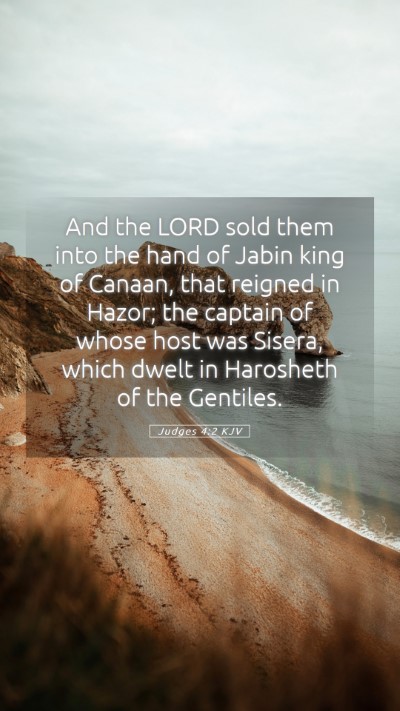Old Testament
Genesis Exodus Leviticus Numbers Deuteronomy Joshua Judges Ruth 1 Samuel 2 Samuel 1 Kings 2 Kings 1 Chronicles 2 Chronicles Ezra Nehemiah Esther Job Psalms Proverbs Ecclesiastes Song of Solomon Isaiah Jeremiah Lamentations Ezekiel Daniel Hosea Joel Amos Obadiah Jonah Micah Nahum Habakkuk Zephaniah Haggai Zechariah MalachiJudges 4:2 Meaning
What is the meaning of Judges 4:2?
And the LORD sold them into the hand of Jabin king of Canaan, that reigned in Hazor; the captain of whose host was Sisera, which dwelt in Harosheth of the Gentiles.
Judges 4:2 Bible Verse Meaning
Bible Verse Reflection: Judges 4:2
Judges 4:2 states: "And the LORD sold them into the hand of Jabin king of Canaan, that reigned in Hazor; the captain of whose host was Sisera, which dwelt in Harosheth of the gentiles." This verse serves as a critical insight into the themes of divine judgment and the cyclical nature of Israel's relationship with God. Below, we analyze the meaning and interpretations from various public domain commentaries.
Understanding the Verse
This verse is pivotal in the narrative of the Israelites during the time of the judges, highlighting several key themes such as:
- Divine Discipline: The phrase "the LORD sold them" indicates that God allowed His people to fall into the hands of their enemies as punishment for their disobedience.
- The Role of Leadership: Jabin and Sisera represent the oppressors of Israel, showcasing how God sometimes uses foreign powers to execute His discipline.
- Historical Context: This period marked the oppression of the Israelites in Canaan, reminding readers of the historical struggles faced by the nation.
Commentary Insights
Drawing from the insights of Matthew Henry, Albert Barnes, and Adam Clarke, we shed light on the deeper meanings behind this verse:
Matthew Henry
Matthew Henry emphasizes the consequences of Israel's rebellion. He notes that God sold them "into the hand," suggesting a powerful divine agency at work in human affairs. Henry comments that God's discipline is purposeful, intended to lead the Israelites back to repentance and reliance on Him.
Albert Barnes
Albert Barnes provides additional context on King Jabin of Canaan. He explains that the Canaanite oppression was not merely political but encompassed spiritual implications for Israel's covenant relationship with God. According to Barnes, this serves as a reminder of the futility of allegiance to foreign gods, which contributed to Israel's suffering.
Adam Clarke
Adam Clarke's commentary expands on the geographical aspects, detailing the locations mentioned. He explains how Hazor and Harosheth were significant cities of that era, symbolizing the stronghold of Canaanite power. Clarke views the mention of specific leaders as indicative of the organized opposition the Israelites faced, which served as a backdrop for the eventual rise of Deborah and Barak.
Theological Implications
The implications of Judges 4:2 reach into the realms of theology and Christian living, indicating:
- The Nature of God’s Justice: God's justice is not only punitive but also redemptive, aiming to bring His people back to Himself.
- The Need for Repentance: This verse serves as a call to acknowledge sin and seek God’s forgiveness, essential for any biblical understanding.
- The Foreshadowing of Deliverance: Just as Israel faced oppression, they were also set on a path towards divine deliverance, illustrated in the subsequent victories led by Deborah.
Application for Today
Judges 4:2 prompts contemporary readers to consider how the themes of this verse apply to modern life:
- Recognizing Personal Struggles: Just as Israel faced oppression, individuals today may encounter personal or spiritual challenges that require reflection and repentance.
- Embracing God’s Guidance: The importance of seeking and adhering to God’s leadership in decision-making aligns with the Israelites' eventual turn back to divine guidance.
- The Cycle of Sin and Redemption: Understanding this cycle can be beneficial for personal Bible study groups and discussions on grace and redemption during online Bible studies.
Related Scriptures
Below are a few cross-references that enrich the understanding of Judges 4:2:
- Judges 2:14: Highlights the discipline of Israel by God through their enemies.
- 1 Samuel 12:9: Discusses God's role in Israel’s history and their cry for deliverance.
- Micah 4:10: References the captivity and the hope for restoration.
Conclusion
Judges 4:2 serves as a poignant reminder of God's involvement in the lives of His people, emphasizing that through discipline, there is a demand for repentance and hope for redemption. The reflections drawn from various commentaries provide a robust framework for understanding this scripture, enriching our Bible study insights and leading to a deeper comprehension of biblical themes.


